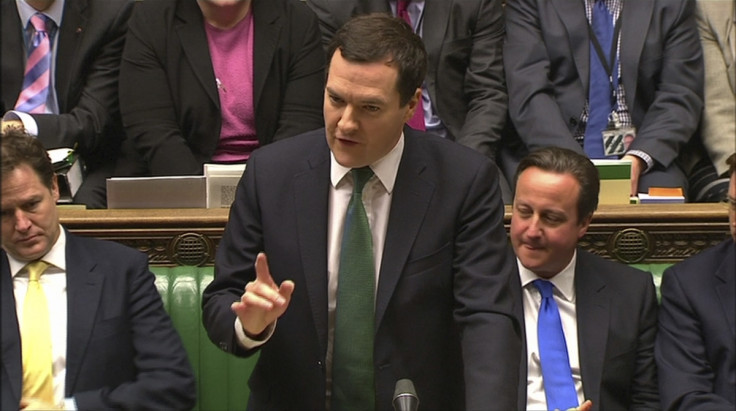Chancellor George Osborne Challenges Labour to Defy Austerity Cuts

Chancellor George Osborne has delivered a stark New Year austerity message with warnings of massive new cuts to welfare to come and a permanent reduction in the size of the state.
In a speech to shift the political debate away from Ed Miliband's chosen "cost of living crisis" agenda and back on to his chosen turf of a recovering economy, Osborne insisted that the government medicine was working but would have to be taken well beyond next year's general election.
And by announcing post-election spending cuts of a further £25b, including a huge £12bn reduction in welfare – something never before achieved - he also set what he hopes will prove a challenge to Labour to either match it or reveal itself to be the high-tax, high-spending party of old who would "again ruin the country".
As ever with Osborne, his speech was as heavily political as it was economic and it underlined his core ideological belief - that both the size of the state and the welfare bill should shrink significantly and permanently. That would be his classic Tory position whatever the state of the economy.
But his message was in danger of being overshadowed by contradictory signals from the government over both future top rate tax cuts and the future of pensioners' benefits such as the winter fuel payment and free travel.
Speaking on the BBC the day before Osborne made his speech, prime minister David Cameron announced a manifesto pledge to continue the current annual increases in state pensions.
But he refused to rule out scrapping pensioners' benefits or, separately, the top rate of tax. The chancellor attempted to dampen down the speculation, insisting that cuts to over-65s' benefits would not raise significant amounts of money. While Downing Street said Cameron was "minded" to continue the policy.
The chancellor's political strategy in the next 15 months to the general election is now clear, and it has opened up a genuine divide between the Tories and both Labour but also the Liberal Democrats.
Shadow chancellor Ed Balls described the speech as a "desperate" attempt to avoid admitting his plan had failed and that working people were on average £1600 a year worse off under the Tories.

And LibDem deputy prime minister Nick Clegg said the Tories were making the "working age poor" pay for spending cuts because they had an ideological belief in "cuts for cuts sake".
But Osborne will be happy if the debate does shift onto this territory believing that, by the time of the 2015 election, those famous "hard working families" will have started feeling the benefits of his economic recovery or will, at the very least, be expecting to feel them imminently.
He will attempt to keep up the pressure on the other parties by putting his cuts package before MPs in a "charter for budget responsibility" and demanding a vote to flush out his opponents.
If they refuse to back his charter, he will accuse them of planning to destroy recovery and go back to high spending and high taxation. It is a trap aimed primarily at Ed Miliband but could also cause collateral damage to the LibDems.
The Chancellor is pursuing what has been called the "baseline strategy" which suggests the government's overall economic policy will be seen as the starting point and it will be deviations from it by other parties that will come under the toughest scrutiny.
Labour, needless to say, will attempt not to fall for it and will put Osborne's baseline itself under scrutiny. But the party is starting with a disadvantage having been forced to abandon its original demands for a "Plan B" from the government once the recovery was shown to be under way.
But there are obvious risks for the Tories in this strategy and promising at least two years' further austerity beyond the next general election.
The single biggest risk lies in convincing voters that the medicine truly is the only one available to cure the patient. With human nature being what it is there is always the risk that voters might be open to persuasion that there is another way that could avoid massive cuts, protect their standards of living and not undermine the economy.
And that, of course, is Miliband's task - convincing the electorate his remedy, while requiring some necessary cuts, will not be driven by an ideological desire to slash the size of the state and welfare.
© Copyright IBTimes 2025. All rights reserved.





















